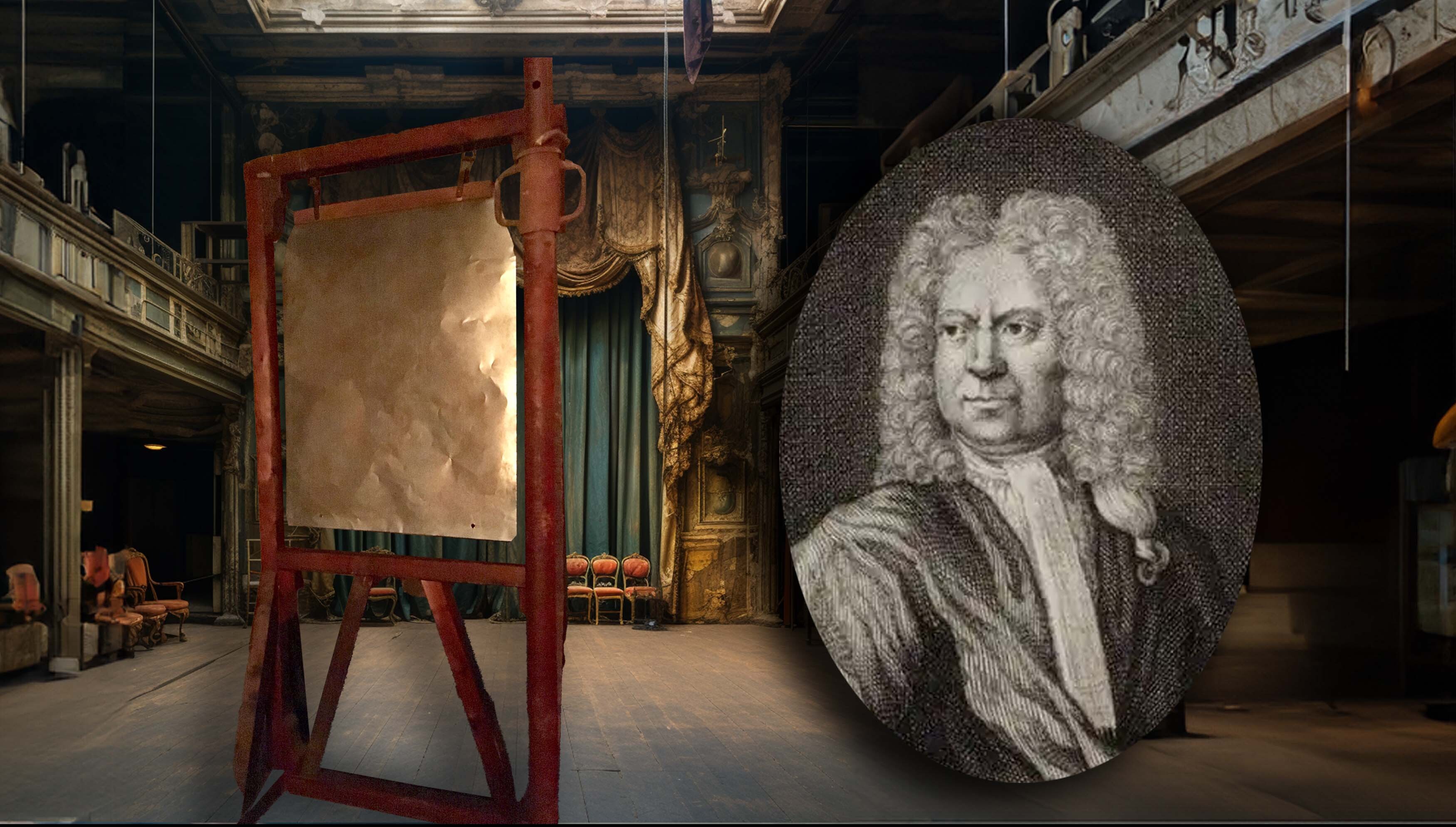Stealing Thunder: John Dennis & The Real Story Behind the Phrase
Did you ever wonder where we got the phrase, “Stealing Someone’s Thunder?” It turns out, it has a very literal origin in 18th century English theater. In this episode, we talk about how theater terms have entered the common vocabulary and examine the story of John Dennis and his wondrous thunder machine. Then we chat with avid theater-goer and world-class Mindreader, Eric Dittelman!

“Blow winds, and crack your cheeks! Rage, blow!
You cataracts and hurricanoes, spout
Till you have drenched our steeples, ⟨drowned⟩ the cocks.
You sulph’rous and thought-executing fires,
Vaunt-couriers of oak-cleaving thunderbolts,
Singe my white head. And thou, all-shaking thunder,
Strike flat the thick rotundity o’ th’ world.
Crack nature’s molds, all germens spill at once
That makes ingrateful man.”
King Lear, William Shakespeare
That’s from the 3rd act of King Lear, where the thunder plays an important role in the setting. So even in some of the stripped down performances of the Shakespeare play, the sound of thunder is often still produced backstage to help set the scene. It’s more than a sound effect. The thunder plays a role in the play – it’s hugely symbolic of the weightiness and chaos that come from King Lear’s decisions. Some theater scholars also see the thunder as the voice of God, being symbolic of divine justice.
In Macbeth, thunder is usually heard whenever the witches appear. It helps to symbolize chaos and trouble.
And it was that use – the use in Macbeth that gives us the origin of the phrase “Stealing someone’s thunder. It came from one of the ingenious ways that people came up with for creating that sound in a world without speakers and digital sound effects.
One of the most creative ways to create the thunder sound backstage was called a “thunder run.” Some people call it a “thunder box,” but that’s also slang for an outhouse, so we’ll stick with thunder run. This was basically a long wooden trough that could be tilted back and forth, or was permanently tilted to one side. Inside the trough, there would be a series of cannonballs. When the balls would roll across the wood, they would create a rolling thunder sound. There are only three remaining examples of a thunder run in England, and only one that actually works – the thunder run at the Bristol Old Vic. Theirs consists of two troughs, each one more than 130 feet long in the rafters of the backstage area. It had stopped seeing use in 1942 until it was restored in 2012. You can book tours of the theater where you can see and hear it in action.
Here’s some audio of a thunder run:
The much more common way to produce thunder is still used today. It’s as simple as a large piece of sheet metal that can be shaken or struck to create the thunder sound. They’re usually hung from a frame and they’re even sold by popular percussion companies who sell cymbals today as a “thunder sheet” and occasionally you’ll see them hanging in the back of orchestras or even rock drummers like Frank Zappa’s drummer Terry Bozzio. If you’ve ever heard an orchestra play Mozart’s “The Magic Flute,” you’ve heard a thunder sheet being used. Here’s an example of what that a thunder sheet sounds like:
https://www.youtube.com/shorts/n36IqbvZ8ZA
The origin of the thunder sheet goes back to a playwright named John Dennis, who created it 315 years ago in London.
Theater plays such an important part in our culture that many of the phrases we use in everyday life originated in the theater.
If you’ve ever called something a “comedy of errors,” that name literally comes from the name of an early Shakespeare play called “Comedy of Errors” in which two twins are continually confused with one another and two servants share the same name.
A more obvious theater reference is “waiting in the wings.” I probably don’t have to explain this one, but I will anyway. In a theater, the wings are the areas to either side of the stage – where an actor may wait for their next appearance onstage. But in everyday life, we use this for anyone waiting for their opportunity.
17th century theater was the first description we saw where someone used the phrase “bringing down the house.”
If you’re “in the limelight,” it means you’re enjoying the attention of others. Limelights were a type of light originally designed for ships, but most commonly used in theaters before electrical lighting. They were an oxyhydrogen flame on a cylinder of lime and then concentrated with a glass lens. These were literally the first theater lights and changed the game. Theaters no longer had to be built with open roofs that faced East and West. Evening theater shows could take place indoors because of limelights.
There’s a giant list of these. I won’t go into them all. “Break a leg!” The story I’ve heard for this one has to do with a “leg line-“ a line on the stage that meant you were in front of the audience and thus getting paid. So you wished people would break the leg line and get paid. There are other possible origins of this one – like John Wilkes Booth breaking his leg when jumping from Lincoln’s theatre box. But the phrase predates 1865.
“Get the show on the road,” “Showstopper,” “The show must go on,” and “Bravo,” all originated in theater and made their way to popular language.
“Upstaging” is used to describe when someone takes over the attention from someone else. And in theater, the upstage area is the one furthest from the audience. And it may seem counter intuitive, but the person furthest upstage would be the one that was speaking or the focus of attention. The other actors onstage would arc away from that position, listening to the person talk. Another term for upstaging is “Stealing someone’s thunder.” And that’s the final phrase we’ll talk about today that has it’s origin in theater.
Let’s get back to John Dennis.
Dennis was a Literary Critic and a Dramatist. In 1704, he made his mark with Liberty Asserted, a stage tragedy that he wrote to strike a chord with popular hatred for the French. The play depicted a violent attack on the French that crowds loved in the theater at London’s Lincoln Inn Fields. He followed it up with another original work entitled “Appius and Virginia.” This was a play that was just a reworking of an earlier play by John Webster and it explored early themes of politics and power in ancient Rome. One of the things that Dennis added to his version, produced at Drury Lane Theater in London, was a unique sound effect. The audience would swear they could hear a storm off in the distance with realistic thunder. Dennis came up with the idea to hang sheet metal from a frame, and shake or strike the metal to mimic the thunder sound. This is the origin of the thunder sheet we discussed earlier.
Sadly for Dennis, his production of Appius and Virginia flopped. It was so bad, no one talked about it, people didn’t go, and the Drury Lane Theater shut it down. This was a huge blow to Dennis, who had previously been a very well-respected critic, but who had become withdrawn and reclusive – some even say threatened by younger culture and newer developments in art and theater. And that helps us understand why he was so angry about what happened next.
It’s awful any time someone steals your work without permission. But Dennis had come up with this ingenious method to very easily create a thunder sound – a sound used by many pieces of theater, especially as a Shakespearean literary device. So when John Dennis attended a staging of Macbeth across town in London, and heard his own design of a thunder device being used backstage during the production, he instantly recognized it. It felt like yet another blow to his career and reputation. He stood up during the performance, interrupting the play and shouted: “That is my thunder, by God; the villains will play my thunder, but not my play.” They had stolen John Dennis’s thunder.
Another version of the story has Dennis standing up and yelling, “Damn them! They will not let my play run, but they steal my thunder!”
And this story became very well known throughout England – so much so, that it lasted hundreds of years. It was first seen in print in the early 1800s. There are some claims that the stealing of thunder idiom goes back to the ancient Romans and the stealing of Thunder from the God Jupiter, but there’s not much evidence to support that. There’s certainly nothing in print that predates the John Dennis story.
So there it is. An unusual story about the origin of another common saying. The Internet Says it’s True. And with that, I will thunder out.

Review this podcast at https://podcasts.apple.com/us/podcast/the-internet-says-it-s-true/id1530853589
Bonus episodes and content available at http://Patreon.com/MichaelKent
For special discounts and links to our sponsors, visit http://theinternetsaysitstrue.com/deals

